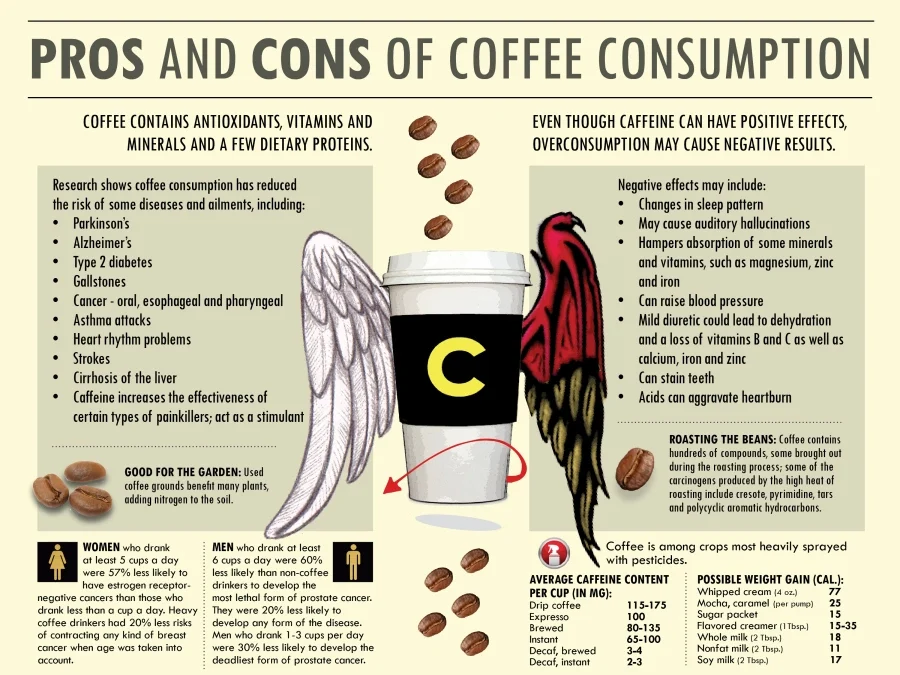
Coffee consumption: Do you rely on your daily cup of coffee to kickstart your brain and get your cognitive wheels turning? You’re not alone. Coffee has been a popular beverage for centuries, and its effects on the brain have long been a topic of interest. But can drinking coffee daily actually improve your cognitive function? In this article, we’ll dive into the research and uncover the truth.

Contents
The Science Behind Coffee and Cognitive Function
Coffee and memory enhancement
One of the most intriguing aspects of coffee’s impact on cognitive function is its potential to enhance memory. Several studies have explored the relationship between goltogel coffee consumption and memory performance, and the findings are promising. For example, a study published in the Journal of Alzheimer’s Disease found that older adults who consumed coffee regularly showed a lower risk of developing memory decline and Alzheimer’s disease. The researchers suggested that coffee’s neuroprotective properties, including its ability to reduce inflammation and oxidative stress, may contribute to these benefits.
Another study conducted by researchers at Johns Hopkins University found that caffeine, the primary active compound in coffee, can enhance memory consolidation. The study participants who consumed caffeine after learning new information performed better on memory tests compared to those who did not consume caffeine. These findings suggest that coffee may have a positive impact on short-term memory and learning abilities.
Coffee and focus and attention
If you’ve ever reached for a cup of coffee when you needed a boost of focus and attention, you’re not alone. Research suggests that caffeine can improve attention and alertness, making it easier to concentrate on tasks. A study published in the Journal of Nutrition found that moderate caffeine consumption improved both attention and alertness in participants, especially during tasks that required sustained mental effort.
The mechanism behind coffee’s effect on focus and attention lies in its ability to block adenosine receptors in the brain. Adenosine is a neurotransmitter that promotes relaxation and drowsiness. By inhibiting adenosine, caffeine increases the activity of other neurotransmitters, such as dopamine and norepinephrine, which are associated with improved focus and attention.
Coffee as a mood enhancer
Coffee is often touted as a mood booster, and research suggests there may be some truth to this claim. A study published in the Archives of Internal Medicine found that women who drank four or more cups of coffee per day had a lower risk of depression compared to those who consumed less coffee or none at all. The researchers hypothesized that caffeine’s stimulatory effects on the central nervous system and its ability to increase the production of neurotransmitters, such as serotonin and dopamine, may contribute to these mood-enhancing effects.
Additionally, a review of studies published in the International Journal of Cardiology found that coffee consumption was associated with a reduced risk of suicide. The researchers proposed that coffee’s antioxidant properties, as well as its effects on neurotransmitters and hormones, could be responsible for its potential mood-enhancing benefits.
Coffee consumption and Brain Health
Coffee and brain health
Beyond its potential effects on memory, focus, and mood, coffee consumption has also been linked to improved overall brain health. Several studies have suggested that regular coffee consumption is associated with a reduced risk of neurodegenerative diseases, such as Alzheimer’s disease and dementia. For example, a study published in the Journal of Alzheimer’s Disease found that coffee drinkers had a lower risk of developing Alzheimer’s disease compared to non-coffee drinkers. The researchers speculated that coffee’s antioxidant and anti-inflammatory properties may play a role in protecting the brain from age-related cognitive decline.
Furthermore, a meta-analysis of studies published in the Journal of Nutrition, Health & Aging found that coffee consumption was associated with a decreased risk of Parkinson’s disease, another neurodegenerative disorder. The researchers suggested that caffeine’s neuroprotective effects, as well as its ability to enhance dopamine transmission, may contribute to this protective effect.
Factors to consider when consuming coffee for cognitive function
While coffee has shown potential cognitive benefits, it’s important to consider several factors when incorporating it into your routine for cognitive enhancement.
- Individual sensitivity: People vary in their sensitivity to coffee and caffeine. Some individuals may experience jitteriness, anxiety, or disrupted sleep with even small amounts of caffeine. It’s essential to pay attention to how your body responds to coffee and adjust your consumption accordingly.
- Timing: The timing of coffee consumption can also impact its cognitive effects. Research suggests that consuming coffee in the morning or early afternoon may be more beneficial for cognitive performance, as caffeine has a half-life of around 5-6 hours. Consuming coffee too close to bedtime can interfere with sleep quality, which can, in turn, impact cognitive function.
- Other lifestyle factors: It’s important to consider other lifestyle factors that can influence cognitive function, such as sleep, exercise, and a healthy diet. While coffee may provide a temporary cognitive boost, it’s not a substitute for a well-rounded approach to brain health.
How Much Coffee Consumption Should You Drink for Cognitive Benefits?
Determining the optimal amount of coffee for cognitive benefits is a complex task. Individual responses to coffee can vary, and the ideal dose may depend on factors such as age, genetics, and overall health. However, research suggests that moderate coffee consumption, typically defined as 3-5 cups per day, may offer the most significant cognitive benefits.
It’s worth noting that exceeding this range may lead to negative side effects, such as increased anxiety, heart palpitations, and disrupted sleep. Additionally, some individuals may be more sensitive to caffeine and may need to consume less coffee to avoid adverse effects.
Ultimately, finding the right balance of coffee consumption for cognitive benefits is a highly individualized process. It’s essential to listen to your body, pay attention to how coffee affects your cognitive function, and make adjustments accordingly.

Other Ways to Improve Cognitive Function: Coffee consumption
While coffee may provide a temporary cognitive boost, there are several other strategies you can incorporate into your daily routine to enhance cognitive function:
- Get enough sleep: Sleep plays a vital role in cognitive function and memory consolidation. Aim for 7-9 hours of quality sleep each night to support optimal brain health.
- Exercise regularly: Physical activity has been linked to improved cognitive function and brain health. Engage in aerobic exercise, such as walking, jogging, or cycling, for at least 150 minutes per week.
- Eat a brain-healthy diet: Consuming a diet rich in fruits, vegetables, whole grains, healthy fats, and lean proteins can support brain health and cognitive function. Include foods such as blueberries, fatty fish, nuts, and dark chocolate in your diet.
- Stay mentally active: Challenge your brain with activities such as puzzles, reading, learning a new skill, or playing a musical instrument. Keeping your brain engaged and stimulated can help maintain cognitive function.
By incorporating these strategies into your lifestyle along with moderate coffee consumption, you can support and enhance your cognitive function.
The Role of Coffee in Enhancing Cognitive Function
In conclusion, the relationship between coffee consumption and cognitive function is a complex and fascinating one. While research suggests that coffee may offer potential cognitive benefits, such as improved memory, focus, and brain health, individual responses can vary. Factors such as sensitivity to caffeine, timing of consumption, and overall lifestyle play a crucial role in determining the impact of coffee on cognitive function.
If you enjoy coffee and find that it enhances your cognitive abilities, moderate consumption within the range of 3-5 cups per day may offer the most significant benefits. However, it’s essential to listen to your body, be mindful of any negative side effects, and consider other lifestyle factors that contribute to overall brain health.
Ultimately, coffee can be a part of a holistic approach to enhancing cognitive function, but it’s just one piece of the puzzle. By incorporating other strategies, such as adequate sleep, regular exercise, a healthy diet, and mental stimulation, you can optimize your cognitive abilities and support long-term brain health. So, go ahead and savor your daily cup of coffee, knowing that it may contribute to your cognitive well-being.
If you’ve found this deep dive into the benefits of coffee consumption enlightening and are curious about more global economic trends that impact our daily lives, we highly recommend reading our article on China’s Inflation. It offers insightful analysis on how economic changes in one of the world’s largest economies could affect us all. Your journey towards understanding the intricate connections between lifestyle choices and broader economic forces starts with a simple click.







